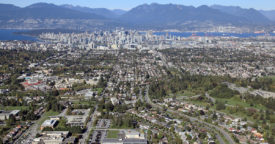Clark:
Now this is a true catastrophe: a craft brewer is worried that climate change is making beer more expensive! Gahh!
Valuable tips for the holidays: 4 ways to hack your brain to avoid impulse purchases!
Physicists with lasers and very big brains are trying to figure out if reality is actually just a hologram. “More specifically, they are trying to either prove or disprove the somewhat mind-bending notion that the third dimension doesn’t exist at all, and that the 3-D universe…actually exists in two dimensions and the third is an illusion produced by the intertwining of time and depth.” Uh, thanks for taking care of that, physicists!!!
It’s been about 5 years since the real estate bubble burst — and Christopher Leinberger argues in The New York Times that depressed fringe suburbs may never rebound.
Drive through any number of outer-ring suburbs in America, and you’ll see boarded-up and vacant strip malls, surrounded by vast seas of empty parking spaces. These forlorn monuments to the real estate crash are not going to come back to life, even when the economy recovers…Many drivable-fringe house prices are now below replacement value, meaning the land under the house has no value and the sticks and bricks are worth less than they would cost to replace. This means there is no financial incentive to maintain the house; the next dollar invested will not be recouped upon resale.
I don’t know if he’s right, but it’s certainly sobering reading.
Alan:
CNN ran a well-informed (if somewhat car-headed) article about whether pay-per-mile insurance and car-sharing plans will curtail North America’s infatuation with road trips.
We already pointed to it in our news digest, but I want to underline the importance of the The Tyee’s series on BC climate action. It’s thoughtful and thorough journalism on what’s arguably the world’s best policy for pricing carbon, and most Cascadians, even British Columbians, know very little about it.
Grist reveals the meaning of the Occupy movement, thanks to an analogy from quantum physics.
Catching up on American Prospect issues from the summer, I found an insightful look at the political salience of Wikipedia as a vehicle for communications, a dissection of the dramatically differing approach to facts and science that the Right and Left naturally take, a much-welcomed reminder from Demos’ uber-important Public Works Project on standing up for government (while also fighting to improve it), and an eye-opening look at school desegregation in Omaha, Nebraska, the unexpected US leader in equalizing access to public education.
Moving from words to pictures now:
Everything from the price of a dinner at Chili’s to the combined value of all debt in the world on a single, mind-popping map of the world’s money. (Do not click unless you’ve got an hour to spare.)
The global micro-enterprise portal KIVA did a compelling data-visualizing video a few months back, which I missed at the time. Watch loans fly back and forth across the map.
Take a few minutes to marvel at our spinning home planet in the darkness of space, as seen from the International Space Station.
Anna:
This is shocking even if it’s nothing new. Almost half of pregnancies in the US are unplanned.
Check out Salon’s new column on designing dream cities (or more precisely, “cities in which we want to live, right now”). Of note, cities using their waterfronts in creative ways and the growing trend of removing freeways from downtown to create new pedestrian spaces.
Frank Luntz, the GOP communications strategist who brought you the death tax and admits that he’s “frightened to death” of the Occupy Wall Street movement because it’s “having an impact on what the American people think of capitalism.” Luntz offered the Republican Governor’s Association some talking points to “fight back.” (Among them, “don’t mention capitalism” (because people think it’s immoral); don’t mention the middle class (because people “don’t trust Republicans to defend it”)—better to talk about “hard working taxpayers”; and don’t talk about “taxing the rich” (better to say that the government “takes from the rich.”) Yep. Wow.
Eric dP:
The flat-out best piece I’ve read recently was one-percenter Nick Hanauer’s foray at Bloomberg.com, “Raise Taxes on the Rich to Reward True Job Creators.” He systematically smashes various conservative canards to argue in favor of a more progressive tax structure that would have the fringe benefit of creating jobs and supporting the American economy. Here’s a sample:
When businesspeople take credit for creating jobs, it is like squirrels taking credit for creating evolution. In fact, it’s the other way around.
It is unquestionably true that without entrepreneurs and investors, you can’t have a dynamic and growing capitalist economy. But it’s equally true that without consumers, you can’t have entrepreneurs and investors. And the more we have happy customers with lots of disposable income, the better our businesses will do.
That’s why our current policies are so upside down…
Since 1980, the share of the nation’s income for fat cats like me in the top 0.1 percent has increased a shocking 400 percent, while the share for the bottom 50 percent of Americans has declined 33 percent.
I very much enjoyed Maria Dolan’s Smithsonian piece about the disappearing habitats of the Vaux’s Swifts. Native to the Northwest, the swifts’ remaining stronghold is in a surprising environment: old brick chimneys. Dolan profiles one historic structure in Monroe, Washington that seasonally houses ten of thousands of swifts, which perform an astonishing evening aerial display to the delight of local birders.
Why is energy journalism so bad?
So which is it? How can three stories from a single source, published over a five-day span, simultaneously claim that supply is adequate and inadequate; and that prices would remain high due to strong demand, but would be so high that they would destroy demand?
Off topic for Sightline, but timely since it’s football season, I was riveted by Greg Bishop’s NYT interview with former all-pro defensive lineman Kris Jenkins. It’s a chilling account of the brutality of NFL play.
Finally, my most enthusiastic recommendation this week is not reading, it’s this wonderful interview by Stephen Colbert with astrophysicist Neil DeGrasse Tyson, courtesy of Scientific American. It’s an hour and a half long, but worth every minute. Even if you don’t have time to watch the whole thing—and who does?—at least listen to it while you work on something else. Listening to Tyson is a great reminder that the most compelling advocates are the ones who speak from a place of love. His sheer glee with science is so infectious that even when I disagree with him (about policy, not science!), I can’t help but find myself half persuaded.









Matt the Engineer
I enjoy imagining where trends will lead in the future thanks to climate change, and beer makes a great example. Let’s start with Coors. It’s a centerally produced (though I’m sure they have some regional breweries), heavy, low value product that contains mostly water. The raw materials are trucked to the brewery, then tankers of beer are trucked to distributors, then cans are trucked to stores, then refrigerated under bright lights, then driven home, then refrigerated again. At least cans are generally recycled and CO2 produced at breweries is reused.
How would this work in an expensive energy world? First, we’d switch to local producers to save on shipping costs (since the heaviest part – the water – is already there). Lagers would be popular in cold regions, ales in all others (no refrigeration needed in brewing process). And you’d probably get a different mix of beers depending on the season. We might see well hopped beers in the Northwest, heavy beers in grain country, lighter beers elsewhere. Bottles would be washed and reused, just like back in the old days.